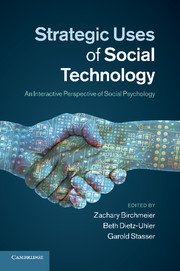Book contents
- Frontmatter
- Contents
- Figures
- Tables
- Notes on the contributors
- Acknowledgments
- 1 Introduction
- 2 A SIDE look at computer-mediated interaction
- 3 Trust, deception, and identity on the internet
- 4 An interactional approach to social influence in computer-mediated communication
- 5 Social interaction in cyberspace
- 6 Dynamics of leader emergence in online groups
- 7 Ostracism in cyberspace
- 8 Opinion-based groups
- 9 A juxtaposition of social influences
- 10 The virtual social world
- Index
- References
8 - Opinion-based groups
(Racist) talk and (collective) action on the internet
Published online by Cambridge University Press: 07 October 2011
- Frontmatter
- Contents
- Figures
- Tables
- Notes on the contributors
- Acknowledgments
- 1 Introduction
- 2 A SIDE look at computer-mediated interaction
- 3 Trust, deception, and identity on the internet
- 4 An interactional approach to social influence in computer-mediated communication
- 5 Social interaction in cyberspace
- 6 Dynamics of leader emergence in online groups
- 7 Ostracism in cyberspace
- 8 Opinion-based groups
- 9 A juxtaposition of social influences
- 10 The virtual social world
- Index
- References
Summary
In this chapter we take a broad view of the social psychology of intergroup relations and apply it to the internet. We start by addressing two popular propositions about the internet. The first of these is that the internet is a safe haven for racists who, using the cover of anonymity, engage in hostile flaming of members of other communities. We can call this first proposition the anonymous cyberhate view of the internet. The second popular proposition is the idea that the internet is a hotbed of social activism where people develop plans to change the world using a device that spans continental boundaries. We call this second proposition the global activist view of the internet.
Let us be clear that there is some truth to both propositions and it is easy to find evidence for both of them. Our contention, however, is that both of the propositions are gross oversimplifications that tend to lead commentators and observers to misunderstand the dynamics present in this medium.
- Type
- Chapter
- Information
- Strategic Uses of Social TechnologyAn Interactive Perspective of Social Psychology, pp. 145 - 171Publisher: Cambridge University PressPrint publication year: 2011
References
- 12
- Cited by

